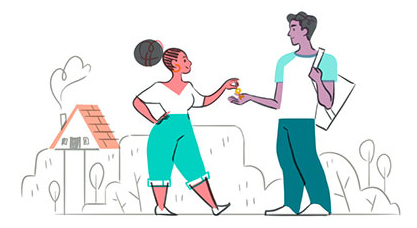About Airbnb
Airbnb started with two designers trying to solve a problem: how to pay their rent

The year was 2007. Brian and Joe — two of our founders and friends from design school — were looking for a way to cover the cost of their San Francisco apartment. That week, they saw an opportunity. An international design conference was coming to town, and every hotel was sold out. They quickly created a website, AirBedandBreakfast.com, with the hope of renting airbeds in their apartment to attendees of the conference. Three designers, Michael, Kat, and Amol, took them up on their offer and became the first guests of Brian and Joe, our first hosts.
When Brian and Joe told people what they were doing, they thought the idea sounded crazy. “Strangers will never stay in each other’s homes,” they said. But something unexpected happened that first weekend. Brian and Joe treated their guests like old friends from out of town, connecting them to a unique slice of San Francisco that they could never have experienced on their own. Michael, Kat, and Amol came as outsiders, but left feeling like locals. The experience left Brian and Joe feeling something special too — the excitement of sharing the city they loved and seeing their guests form a deep connection to it.
Brian and Joe started thinking: maybe there were more people like Michael, Kat, and Amol who would like to travel this way and more people who would like to host this way. These are the ideas that Airbnb was founded on.
In 2008, Nate, a software engineer, joined Brian and Joe, and together the three founders took on a bigger design problem: how do you make strangers feel comfortable enough to stay in each other’s homes? The key was trust. The solution they designed combined host and guest profiles, integrated messaging, two-way reviews, and secure payments built on a technology platform that unlocked trust, and eventually led to hosting at a global scale that was unimaginable at the time.

13 years later...
Today, the idea does not seem so crazy after all. Our more than 4 million hosts now offer everything from a private room in their home to luxury villas, from one night to several months at a time. Hosting has expanded from homes to now include experiences that can be taken in cities all over the world, or even online.

